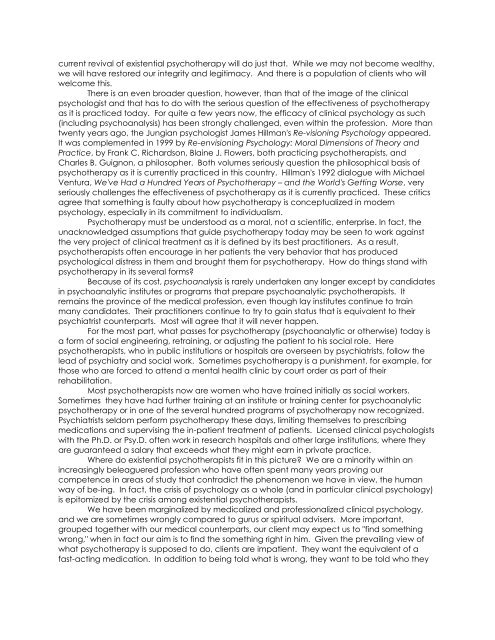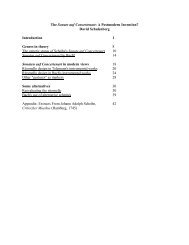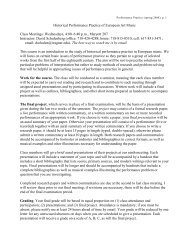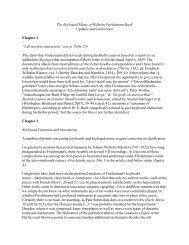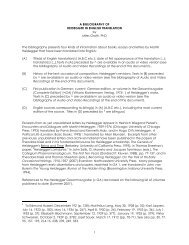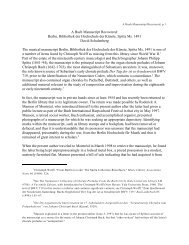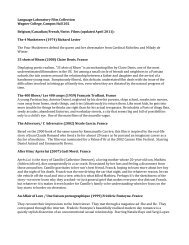SEVEN PAPERS ON EXISTENTIAL ANALYSIS ... - Wagner College
SEVEN PAPERS ON EXISTENTIAL ANALYSIS ... - Wagner College
SEVEN PAPERS ON EXISTENTIAL ANALYSIS ... - Wagner College
You also want an ePaper? Increase the reach of your titles
YUMPU automatically turns print PDFs into web optimized ePapers that Google loves.
current revival of existential psychotherapy will do just that. While we may not become wealthy,<br />
we will have restored our integrity and legitimacy. And there is a population of clients who will<br />
welcome this.<br />
There is an even broader question, however, than that of the image of the clinical<br />
psychologist and that has to do with the serious question of the effectiveness of psychotherapy<br />
as it is practiced today. For quite a few years now, the efficacy of clinical psychology as such<br />
(including psychoanalysis) has been strongly challenged, even within the profession. More than<br />
twenty years ago, the Jungian psychologist James Hillman's Re-visioning Psychology appeared.<br />
It was complemented in 1999 by Re-envisioning Psychology: Moral Dimensions of Theory and<br />
Practice, by Frank C. Richardson, Blaine J. Flowers, both practicing psychotherapists, and<br />
Charles B. Guignon, a philosopher. Both volumes seriously question the philosophical basis of<br />
psychotherapy as it is currently practiced in this country. Hillman's 1992 dialogue with Michael<br />
Ventura, We've Had a Hundred Years of Psychotherapy – and the World's Getting Worse, very<br />
seriously challenges the effectiveness of psychotherapy as it is currently practiced. These critics<br />
agree that something is faulty about how psychotherapy is conceptualized in modern<br />
psychology, especially in its commitment to individualism.<br />
Psychotherapy must be understood as a moral, not a scientific, enterprise. In fact, the<br />
unacknowledged assumptions that guide psychotherapy today may be seen to work against<br />
the very project of clinical treatment as it is defined by its best practitioners. As a result,<br />
psychotherapists often encourage in her patients the very behavior that has produced<br />
psychological distress in them and brought them for psychotherapy. How do things stand with<br />
psychotherapy in its several forms?<br />
Because of its cost, psychoanalysis is rarely undertaken any longer except by candidates<br />
in psychoanalytic institutes or programs that prepare psychoanalytic psychotherapists. It<br />
remains the province of the medical profession, even though lay institutes continue to train<br />
many candidates. Their practitioners continue to try to gain status that is equivalent to their<br />
psychiatrist counterparts. Most will agree that it will never happen.<br />
For the most part, what passes for psychotherapy (psychoanalytic or otherwise) today is<br />
a form of social engineering, retraining, or adjusting the patient to his social role. Here<br />
psychotherapists, who in public institutions or hospitals are overseen by psychiatrists, follow the<br />
lead of psychiatry and social work. Sometimes psychotherapy is a punishment, for example, for<br />
those who are forced to attend a mental health clinic by court order as part of their<br />
rehabilitation.<br />
Most psychotherapists now are women who have trained initially as social workers.<br />
Sometimes they have had further training at an institute or training center for psychoanalytic<br />
psychotherapy or in one of the several hundred programs of psychotherapy now recognized.<br />
Psychiatrists seldom perform psychotherapy these days, limiting themselves to prescribing<br />
medications and supervising the in-patient treatment of patients. Licensed clinical psychologists<br />
with the Ph.D. or Psy.D. often work in research hospitals and other large institutions, where they<br />
are guaranteed a salary that exceeds what they might earn in private practice.<br />
Where do existential psychotherapists fit in this picture? We are a minority within an<br />
increasingly beleaguered profession who have often spent many years proving our<br />
competence in areas of study that contradict the phenomenon we have in view, the human<br />
way of be-ing. In fact, the crisis of psychology as a whole (and in particular clinical psychology)<br />
is epitomized by the crisis among existential psychotherapists.<br />
We have been marginalized by medicalized and professionalized clinical psychology,<br />
and we are sometimes wrongly compared to gurus or spiritual advisers. More important,<br />
grouped together with our medical counterparts, our client may expect us to "find something<br />
wrong," when in fact our aim is to find the something right in him. Given the prevailing view of<br />
what psychotherapy is supposed to do, clients are impatient. They want the equivalent of a<br />
fast-acting medication. In addition to being told what is wrong, they want to be told who they


